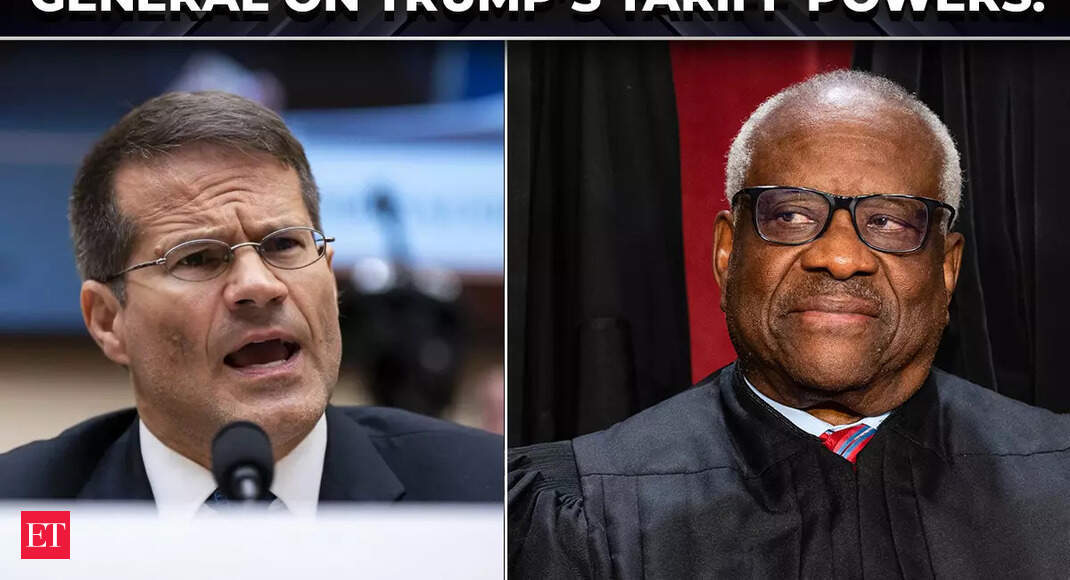World
Supreme Court Justices Challenge Solicitor General on Trump’s Tariffs

During a significant Supreme Court hearing on March 25, 2024, Justice Clarence Thomas engaged Solicitor General D. John Sauer in a rigorous examination of the constitutional authority surrounding President Donald Trump’s tariff powers. The case, which has implications for trade policy and executive authority, prompted challenging questions about the scope of presidential powers in imposing tariffs.
Justice Thomas raised concerns regarding the legal framework that allows for such tariffs, particularly in relation to the concept of “trading with enemies.” He pressed Sauer on whether existing laws adequately define the limits of executive power when it comes to levying tariffs against foreign nations. This inquiry reflects broader apprehensions about the balance of power between Congress and the presidency in trade matters.
Sauer defended the administration’s stance, arguing that the tariffs are justified under the Trading with the Enemy Act and the International Emergency Economic Powers Act. These laws, he contended, grant the president the authority to act decisively in national interests, especially in situations perceived as threats to the United States.
The discussion highlighted the tension between national security and economic strategy, demonstrating the complexities involved in trade relations. Thomas’s pointed questions underscored the potential ramifications of unchecked executive power, particularly in the context of ongoing trade disputes with several countries.
Legal experts are closely monitoring the proceedings, as the outcome could redefine the extent of presidential authority in economic matters. The justices’ inquiries reflect not only legal considerations but also the political landscape surrounding trade policies under the Trump administration.
As the hearing unfolded, it became evident that the justices are grappling with the intersection of law, trade, and national security. The Supreme Court’s ruling on this matter could have lasting implications for future administrations and their ability to impose tariffs without congressional approval.
The case encapsulates a pivotal moment in U.S. trade policy, raising fundamental questions about the separation of powers and the role of the judiciary in overseeing executive actions. As deliberations continue, the nation awaits a decision that may reshape its approach to international trade and executive authority for years to come.
-

 World5 months ago
World5 months agoSBI Announces QIP Floor Price at ₹811.05 Per Share
-

 Lifestyle5 months ago
Lifestyle5 months agoCept Unveils ₹3.1 Crore Urban Mobility Plan for Sustainable Growth
-

 Science4 months ago
Science4 months agoNew Blood Group Discovered in South Indian Woman at Rotary Centre
-

 World5 months ago
World5 months agoTorrential Rains Cause Flash Flooding in New York and New Jersey
-

 Top Stories5 months ago
Top Stories5 months agoKonkani Cultural Organisation to Host Pearl Jubilee in Abu Dhabi
-

 Sports4 months ago
Sports4 months agoBroad Advocates for Bowling Change Ahead of Final Test Against India
-

 Science5 months ago
Science5 months agoNothing Headphone 1 Review: A Bold Contender in Audio Design
-

 Top Stories5 months ago
Top Stories5 months agoAir India Crash Investigation Highlights Boeing Fuel Switch Concerns
-

 Business5 months ago
Business5 months agoIndian Stock Market Rebounds: Sensex and Nifty Rise After Four-Day Decline
-

 Sports4 months ago
Sports4 months agoCristian Totti Retires at 19: Pressure of Fame Takes Toll
-

 Politics5 months ago
Politics5 months agoAbandoned Doberman Finds New Home After Journey to Prague
-

 Top Stories5 months ago
Top Stories5 months agoPatna Bank Manager Abhishek Varun Found Dead in Well









